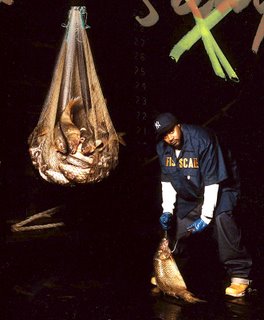The Dispensation of Ghostface Killah

I've already posted elsewhere about this, but I thought it too awesome to pass up the chance to post it here, too.
Ghostface Killah, aka Iron Man, aka Tony Stark, aka Dennis Coles to his momma, is one of the original members of the Wu-Tang Clan, perhaps the seminal rap group/collective/community of the 90s. I remember when my friend Tony had me borrow one of their albums in 1998ish or so, and I found it way too saucy back then (oh, how the times have changed). Ghostface was always one of the hardest to understand of his Wu-Tang compatriots, due to his frequent stream-of-conscious rhymes. He still releases albums under his Ghostface moniker, and has been one of the more active members of the Wu-Tang collective over the past few years.
 In a recent interview concerning the prospects of a(nother) Wu-Tang reunion album, Ghostface let it be known that he doesn't mind if people without the means to buy his albums download them instead. While on record as disliking illegal downloading in general, he wouldn't frown upon poor people who downloaded his music: "I mean, if you're poor, yeah."
In a recent interview concerning the prospects of a(nother) Wu-Tang reunion album, Ghostface let it be known that he doesn't mind if people without the means to buy his albums download them instead. While on record as disliking illegal downloading in general, he wouldn't frown upon poor people who downloaded his music: "I mean, if you're poor, yeah."This is great news, I think. Never before has an artist taken a stand on poor people downloading music before, at least to my knowledge. It's a very Robin Hood concept, but with a 21st century twist: If you can afford it, pay for the album. But if you can't, digitally steal it from me, yeah. Can you imagine Metallica taking this stance? Or Madonna? Or Matchbox 20? (Do poor people even listen to Matchbox 20? I've been nominally poor before, and I've lived in poor neighborhoods, but I don't remember hearing much Matchbox 20.) If anything can be said about this, it's that Ghostface is incredibly progressive when it comes to music downloading. Maybe the RIAA should take the hint.
Perhaps downloading is a bit out of reach for the average person who can't afford to buy Ghostface's latest album. I mean, if you could afford a PC and a broadband connection, it would be logical to assume you would have the means to buy CDs, too. BUT, if you're like some people I know, who were gifted a second-hand computer and steal/borrow high-speed from their neighbor, you can get a picture of how Ghostface's reprieve might work in everyday life.
 Plus, should a dispensation such a Ghostface's opens up new doors for artists who might have a special place in their hearts for the poor? (As a side note, it's important to point out that Ghostface, an AfroAmerican artist who has seen/experienced poverty growing up, would be one of the first to "authorize" illegal downloading for the poor.) Can you imagine if Christian artists publicly allowed disadvantaged persons to have their music for free? (Keith Green did something like this in the early 80s.) I'm not saying they'd like it, but still, it's the thought that counts....
Plus, should a dispensation such a Ghostface's opens up new doors for artists who might have a special place in their hearts for the poor? (As a side note, it's important to point out that Ghostface, an AfroAmerican artist who has seen/experienced poverty growing up, would be one of the first to "authorize" illegal downloading for the poor.) Can you imagine if Christian artists publicly allowed disadvantaged persons to have their music for free? (Keith Green did something like this in the early 80s.) I'm not saying they'd like it, but still, it's the thought that counts....Finally, and this is directed to the more pastory types on our blog, how do copyright issues work in performing songs by artists in the context of your worship services? Are churches supposed to pay to use copywritten songs? Do they? Are there any songwriters who exempt churches (strapped or otherwise) from having to pay these charges? And since I'm not as up on the praise & worship scene as I used to be, are there any "worship artists" who disseminate their works for absolutely free?
In closing, I'd just like to give mad eprops to Ghostface Killah, for doing something (even if it was an aside) most artists wouldn't even pause to think about. Including, unless I'm mistaken, our esteemed friends, Bono and Company. Go Ghostface, go Ghostface, go!


3 Comments:
Yes, thank you Ghostface and I am happy to report I have already taken him up on his offer, even before I knew about his reasonable kindness.
I don't think I've seen the phrase "AfroAmerican" in print in literally years. Good job Ghostface. Good job JOnny.
Yeah, I'm sick of all the extra syllables. Why say the -ican twice when it's already part of American? Personally, I'm against all kinds of -icans of any sort. Except wiccans, but there's two c's there so I think I'm okay.
Post a Comment
<< Home